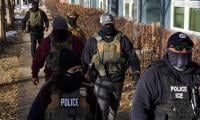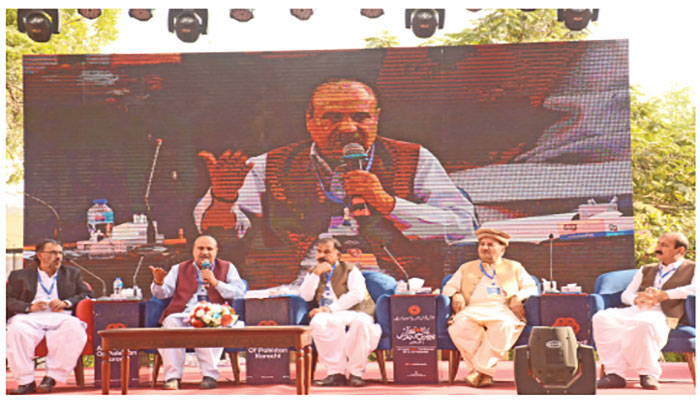‘Every other work of contemporary Pashto literature deals with war, radicalisation of society’
A large number of audience at the session on the Pashto literature at the 14th International Urdu Conference’s ultimate day on Sunday proved the fact that Karachi was the city with the largest number of Pakhtuns in the world.
With so many Pakhtuns, it was natural that Karachi must be producing many writers and authors of Pashto but most of them produced literary works in obscurity until the Pakhtun Thinkers Forum founder and veteran politician, the late Qasim Jan, organised a movement to bring the Pashto writers of Karachi to the limelight. Now, the city is a cultural centre of Pashto and enthusiasm at the session on Pashto at the conference was evident of this fact.
In the session, titled ‘75 Years of Pashtu Literature’, political commentator and linguist Dr Khadim Hussain delivered a comprehensive lecture on the past, present and future prospects of the Pashto literature.
He said that stability could be achieved in any society only if the language of its people was given due respect and made the medium of education.
He told the event that Pashto was a developed language and it had a rich literature produced over past several centuries. He, however, identified three major movements in the history of the Pashto literature that shaped the prose and poetry of the language in the years to come.
The first movement, the speaker said, was the enlightened movement of the 16th century also known as the Roshaniyya Movement founded by Bayazid Ansari famously known as Pir Roshan. He was a revolutionary leader who challenged the social injustice system of the Mughals.
The second major movement of the Pashto literature started with the revolt of Khushal Khattak against the Mughal Empire. Khattak was a great poet and writer who authored several books, Dr Hussain said, adding that Khattak’s revolt was not an organised movement but it heavily inspired the Pashto literature.
The third major movement, according to the speaker, was the result of nationalist movements such as the Khudai Khidmatgar movement of Bacha Khan and Wror Pashtun of Abdul Samad Khan Achakzai.
“Languages are the containers of ideas and thoughts, and when a language loses importance, it resultantly kills the creative talents of its speakers,” Dr Hussain maintained. He asserted that the Pashto literature had historically reflected resistance and antipathy towards terrorism, class system, dictatorship and oppression. “We can see that a significant part of the modern Pashto fiction was translated from Russian, English, and Urdu,” he remarked.
Sarwar Shamal, another speaker at the session, said the contemporary Pashto literature extensively dealt with the themes of terrorism, violence and radicalisation of the Pashtun society.
He stated that if we read the Pashto poetry, fiction, plays and works in other literary genres produced during the past several decades, we would find that every other literary work discussed war, violence and extremism instead of dealing with the traditional themes of love and beauty.
A Karachi-based Pashto poet, Sagar Tanqidi, said the Pashto literature in Karachi had begun before Partition and with the passage of time, many Pashto works produced by writers and poets living in Karachi were considered among the top contemporary works in the language. He said Pashto novelist Tahir Afridi and late poet Riaz Tasneem were among those Karachi residents who contributed greatly to the Pashto literature.
-
 Jason Momoa Says Being With Beau Adria Arjona Feels 'perfect'
Jason Momoa Says Being With Beau Adria Arjona Feels 'perfect' -
 Idris Elba Says One Mix-up Nearly Cost Him A Knighthood From King Charles
Idris Elba Says One Mix-up Nearly Cost Him A Knighthood From King Charles -
 Andrew Mountbatten Windsor Incurs Anger Of Biggest Royal
Andrew Mountbatten Windsor Incurs Anger Of Biggest Royal -
 Megan Fox, Machine Gun Kelly's Relationship 'is Just About Co-parenting'
Megan Fox, Machine Gun Kelly's Relationship 'is Just About Co-parenting' -
 Prince Harry, Meghan Markle Warned They Can’t Fool Brits Because It Won’t Land
Prince Harry, Meghan Markle Warned They Can’t Fool Brits Because It Won’t Land -
 South Korea’s Ex-president Yoon Suk Yeol, Sentenced To 5 Years In Prison: Key Details Explained
South Korea’s Ex-president Yoon Suk Yeol, Sentenced To 5 Years In Prison: Key Details Explained -
 Princess Beatrice Is ‘terrified’ Of Mom Fergie: ‘She’s Begging Her To Not Destroy Her Future’
Princess Beatrice Is ‘terrified’ Of Mom Fergie: ‘She’s Begging Her To Not Destroy Her Future’ -
 Harry Styles’ New Album Earns Subtle Nod From Zoe Kravitz’s Dad
Harry Styles’ New Album Earns Subtle Nod From Zoe Kravitz’s Dad -
 Ari Emanuel Makes A Decision Regarding His Memoir Alongside Prince Harry’s Ghostwriter
Ari Emanuel Makes A Decision Regarding His Memoir Alongside Prince Harry’s Ghostwriter -
 Buckingham Palace Gives The Spotlight To The Duke And Duchess Of Edinburgh: Video
Buckingham Palace Gives The Spotlight To The Duke And Duchess Of Edinburgh: Video -
 Eva Mendes Revisits Year She Hid Pregnancy
Eva Mendes Revisits Year She Hid Pregnancy -
 Andrew’s Eviction Marks: ‘the End Of Grifting’: ‘It A Catastrophic Fall From Grace’
Andrew’s Eviction Marks: ‘the End Of Grifting’: ‘It A Catastrophic Fall From Grace’ -
 ASAP Rocky Disses Rihanna's Ex Drake In New Track
ASAP Rocky Disses Rihanna's Ex Drake In New Track -
 Jennifer Aniston, Jim Curtis Face One Major Hurdle In Their Union
Jennifer Aniston, Jim Curtis Face One Major Hurdle In Their Union -
 Restaurant Workers Detained After ICE Agents Dine At Minnesota Eatery
Restaurant Workers Detained After ICE Agents Dine At Minnesota Eatery -
 Kate Middleton Reveals Sport She Would Not Play With Prince George
Kate Middleton Reveals Sport She Would Not Play With Prince George




